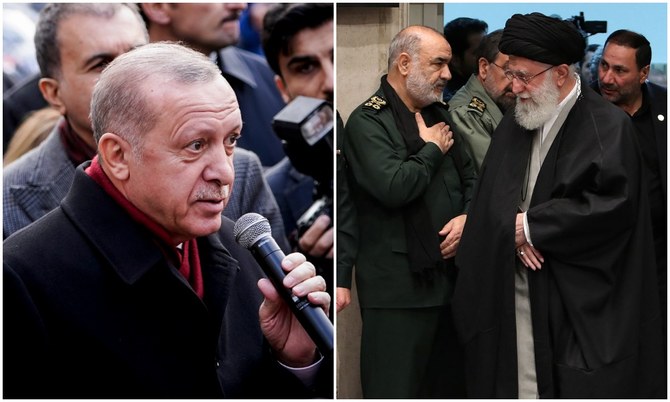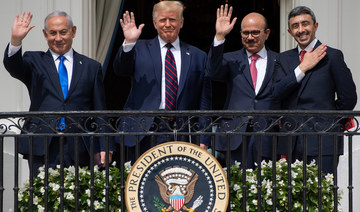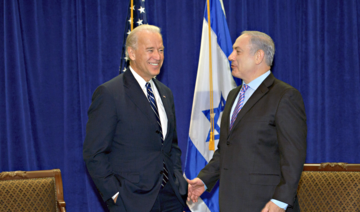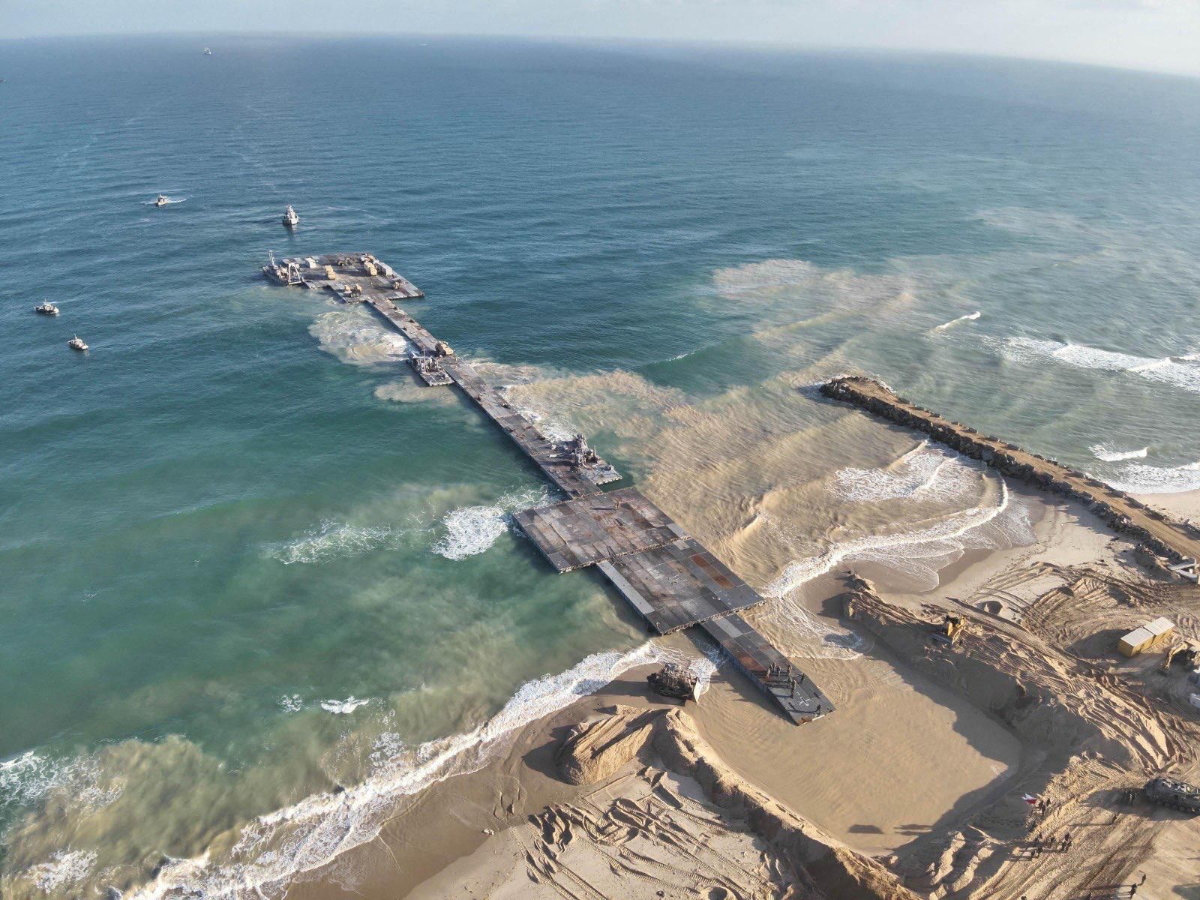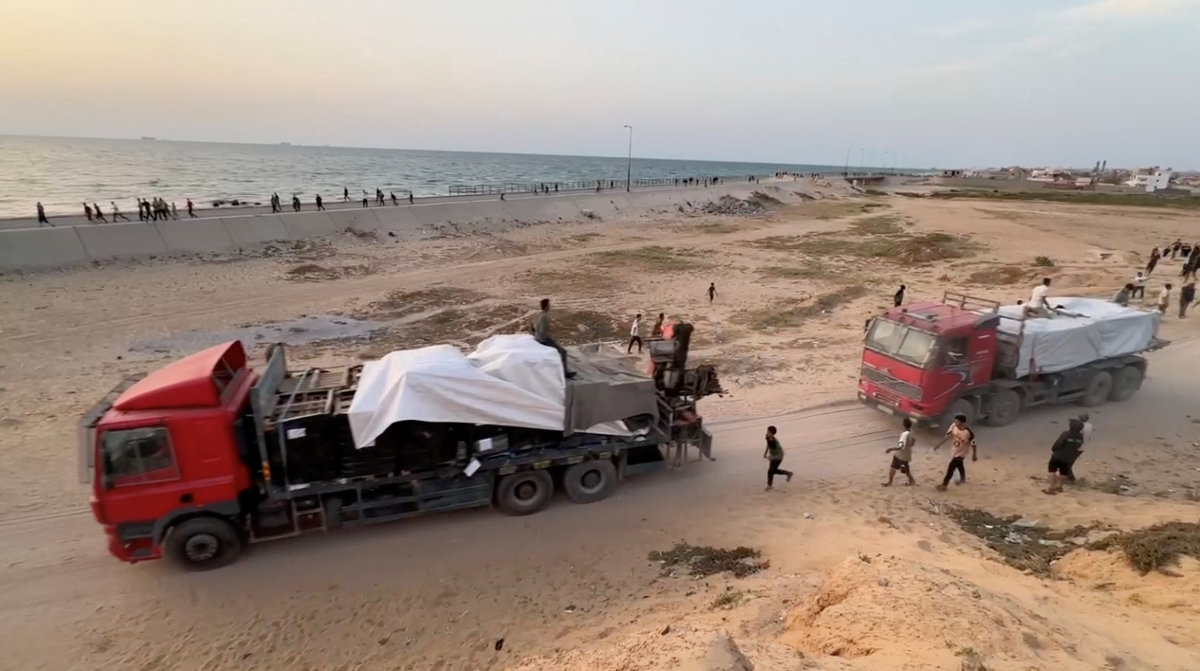DUBAI: Turkey and Iran are the big “losers” of the normalization of relations between the UAE and Bahrain with Israel, but the treaties signed by the three countries are not directed against any third party, according to participants in the just concluded Abu Dhabi Strategic Debate.
A key takeaway from three days of discussions was that the Abraham Accords are about solving the Arab-Israeli conflict and approaching it in a strategic and realistic way, while creating momentum for peace in the entire Middle East.
Organized by the Emirates Policy Centre, the seventh edition of the annual debate featured virtual panel discussions in which strategic experts, researchers and policy-makers participated from all over the world.
Taking part in a debate on Wednesday entitled “Middle East between Political Rationality and Delusions,” Khalifa Shaheen Al-Marar, UAE assistant minister for political affairs at the Ministry of Foreign Affairs, put it this way: “The Abraham Accords represent a massive and ongoing project; the more we get tangible results from the agreement, the more we incentivize finding peaceful solutions to ongoing conflicts.”
He added: “To build on the success and momentum of the accords, we need renewed efforts in finding a solution for the Palestinian peace process based on a two-state solution.”
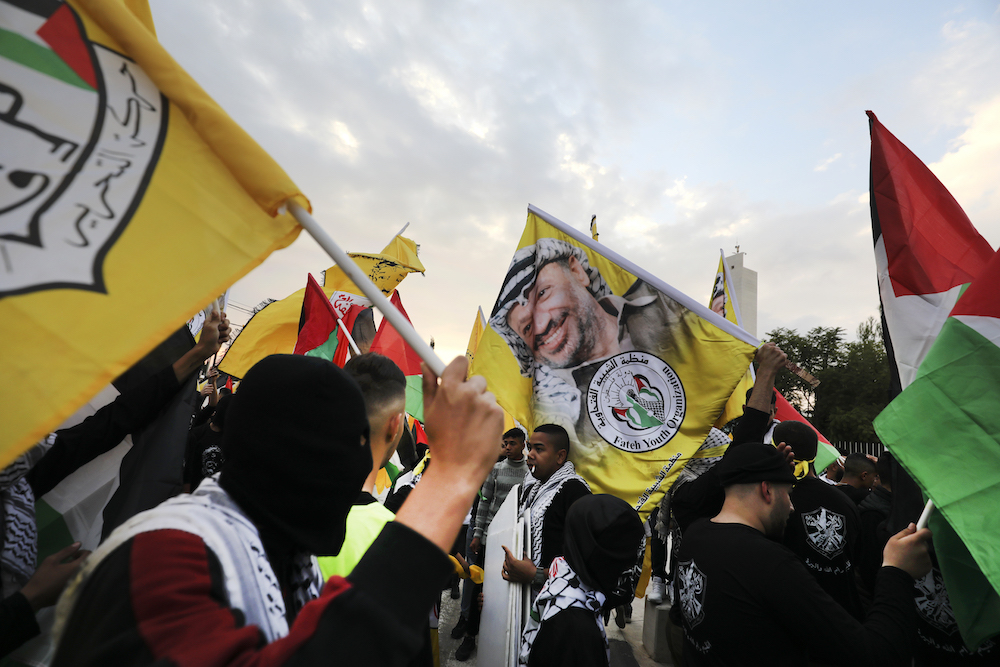
Palestinian youths lift portraits of late Palestinian President Yasser Arafat during a rally by Fatah supporters to mark the 16th anniversary of his death, in the West Bank city of Ramallah on November 11, 2020. (AFP)
Two experts who took part in a separate panel discussion on Wednesday entitled “Decoding the Region in the Aftermath of the Treaty” called for more dialogue among the signatories to the Abraham Accords and other Middle East countries with a view to begin de-escalation of regional tensions.
“I see Iran as a loser in the sense of losing out geopolitically, ideologically and politically at home,” said Alex Vatanka, senior fellow and director of the Iran program at The Middle East Institute.
“Geopolitically, the Iranian regime is now concerned with what Israeli presence in the Gulf will mean for Iran’s security. Ideologically, the axis of resistance is on the defensive. It is clear that the armed struggle option against Israel has not worked and perhaps it is time to try a different approach. Domestically this is an embarrassment for Iran in the eyes of Iranians.”
He said Iran now will have to come up with policy solutions and, more importantly, engage in introspection. “The question mark is still out there as to how much Israel and the Gulf will cooperate militarily and in intelligence, which will shape Iran’s actions going forward,” he said.
“Iran has made a giant mistake for the last 42 years by believing that it can come to terms with the Gulf states by going through Washington, and it is a false premise that’s not going to work. The axis of resistance is on the defensive, which puts pressure on Iran.”
According to Vatanka, should the Abraham Accords end up creating tangible new ways of cooperation involving Israel and the Gulf, it would make life harder for the ideological message that Iran has been promoting for the last 42 years. “This is an embarrassment for Iran and a failure on their part,” he said.
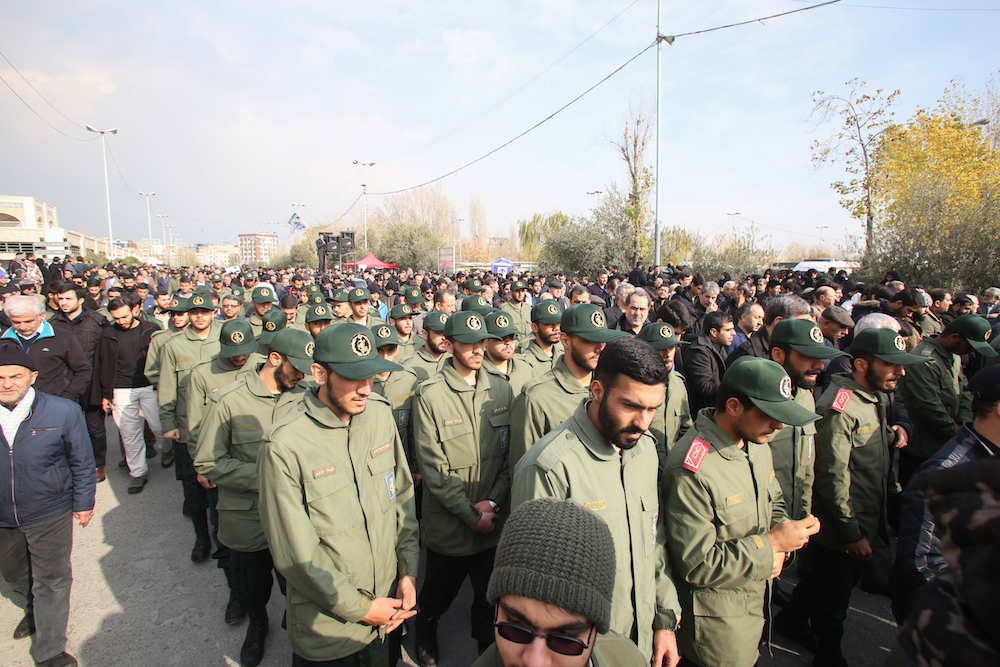
Members of Iran's Islamic Revolutionary Guard Corps (IRGC) take part in a demonstration against American "crimes" in Tehran on January 3, 2020 following the killing of Iranian Revolutionary Guards Major General Qasem Soleimani in a US strike on his convoy at Baghdad international airport. (AFP/File Photo)
“Iranian foreign policy has invited massive sanctions on the country and put the entire regime at risk. Iranians are going to come out on the streets and everything the Islamic Republic stands for will now be challenged, unlike any time you have seen it before. That is a real risk for the regime.”
Turkey too finds itself on the wrong side of the new Middle East order following the normalization of ties by Israel with the UAE and Bahrain, according to the other panel participant. Omar Taspinar, senior fellow at the Brookings Institution, said Turkish President Recep Tayyip Erdogan is seeking to create the perception of a Turkey that is strong in the region, in the eyes of the Muslim Brotherhood and hundreds of millions of Muslims.
He said the Abraham Accord confirms the sense of isolation that Turkey is feeling in the region, because Israel was an ally of Turkey not too long ago. “Now Turkey is increasingly perceived as an Islamist country,” Taspinar said. “This plays a role in the sense of anger, resentment and victimhood of Turkey. And Erdogan will use this victimhood to turn it to his advantage by stating that he is one of the few (remaining) allies of the Palestinian cause.”
Taspinar said Erdogan is playing the game along the lines of Turkey being one of the few countries that is able to challenge the dynamic in the region that is going towards the legitimization of Israel. “There is irony in this, because you can ask what has Turkey done for the Palestinians? This is more perception than reality, (but) Erdogan is in the business of creating perceptions,” he said.
******
READ MORE: Experts weigh up Biden’s Middle East policy options at Abu Dhabi Strategic Debate
Analysts debate impact of Israel-UAE-Bahrain accords at Abu Dhabi Strategic Debate
******
Taspinar believes “politically, Erdogan is determined to send the message that he is a supporter of the Palestinian cause as an additional step in his populist messages to the world and his domestic base.”
With President Donald Trump’s projected defeat in the US elections, Turkey is “the biggest loser,” Taspinar said, adding that a sense of panic had settled in Ankara today with regard to a Biden administration because it will not be interested in a reset without Turkey abiding by certain norms, including becoming a loyal NATO ally and figuring out a new path for relations in Syria.
“The US under (President Biden) will have a lot of leverage economically against Erdogan, and the economy is where Erdogan is the most vulnerable because Turkey does not have oil nor natural gas. It is totally dependent (economically),” Taspinar said. “The Turkish economy and the lira are now in free fall, and without the economy doing well, Erdogan might lose the election.”
However, Taspinar does not foresee Erdogan calibrating his “pro-Islamist” foreign policy because of the worsening economic situation in Turkey. “As the economy worsens, Turkey will look at opportunities in the Middle East to wave the flag of political Islam to distract attention from the mismanagement of the economy at home,” he said.
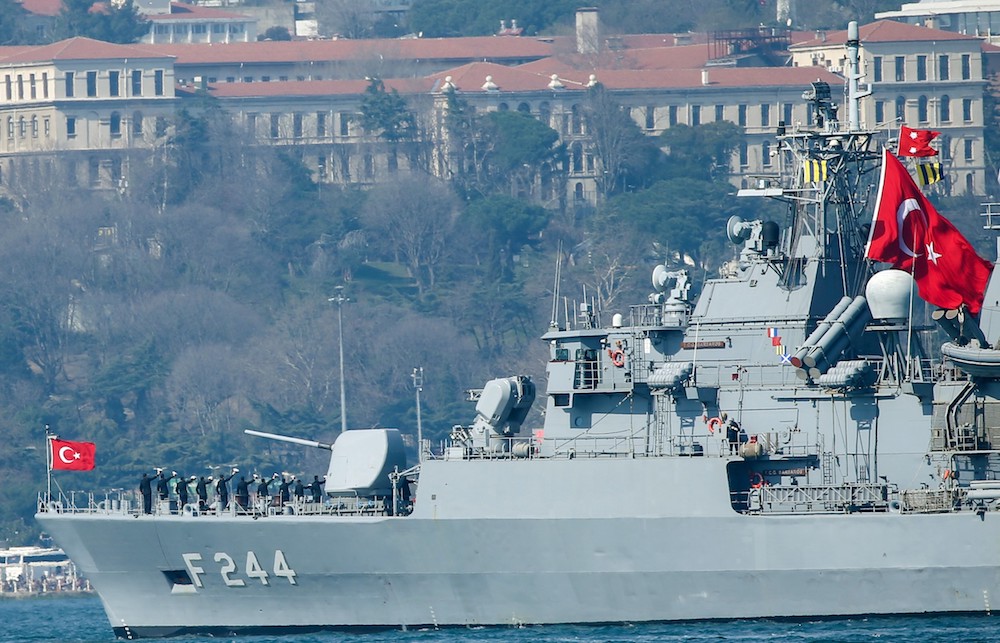
A battleship of Turkish Naval Forces, which took part in the Blue Homeland 2019 Drill, passes Bosphorus in Istanbul, Turkey on March 09, 2019. (AFP/File Photo)
For his part, Vatanka said success stories will need to be attached to the UAE-Bahrain-Israel accord, and one of them is to bring the Palestinians into the conversation as soon as possible. “They cannot be left out in the cold,” he said. “If the Palestinians accept the new realities on the ground, it will make life a lot more difficult for Turkey and Iran to use the Palestinian issue for their own political purpose.”
He said it was vital for the sake of the UAE, Gulf stability and Israel neither to undo the accord any time soon, nor to become a staging ground for operations against Iran, as this may force the Iranians to retaliate. “If Iran chooses to go in the direction of trying to broaden the conversation in its foreign policy, that could be the beginning,” Vatanka said.
“If Iran decides it will take the option of saving the nuclear deal and broadening the conversation, which could happen in six months, then the US will then be accepted by Iran as a player in the region. You have to have the Gulf states at the table; this is something that Washington and Tehran have to accept if for real sustainable de-escalation in the region.”
Vatanka said the election of Biden could have been the perfect opportunity for Iran’s Supreme Leader Ali Khamenei to shift in a new direction and blame the deteriorating relationship with the US on Trump. “Instead he has called the entire US government corrupt and criticized the elections. This is an indication that he is still thinking small and not willing to change the overall position of being a revolutionary militant Islamist state,” he said.
--------------------
Twitter: @CalineMalek



